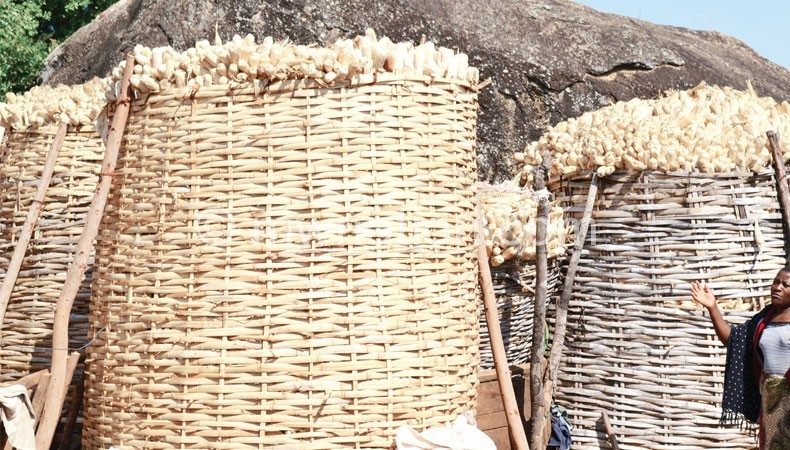Tolerant seeds for resilient harvests
In Mzimba and Kasungu, ‘you reap what you sow’ is a familiar saying like no other. From the tobacco-growing population’s experience, the nursery determines what you reap.
Ask the farmers about waning maize harvests amid effects of climate change and they will promptly evoke a time-honoured saying which demonstrates why choosing the right seeds could be a vital start to a winning battle against an increasingly unpredictable rain patterns often marked by droughts.
”Fodya ndi ku nazale,” says Kasungu North farmer Eliza Amos Banda on how a healthy nursery begets a good harvest.
The maize farmer, who owns Chimwemwe Farm in Mphomwa, knows climate change leaves maize farmers with difficult decisions. For the vast majority of rural growers, they must leave behind the local varieties they have grown up knowing as potential seeds for the next growing season and embrace high-yielding hybrids that entail buying seeds every year.
Those who have already taken the desired shift to hybrid maize are sometimes discouraged seeing the crop wither into nothing, especially when dry spells suddenly hit at tussling stage.
No farmer is happy seeing wilting crop fields and the calls are gaining sway in the countryside that seed companies must start delivering drought-resistant varieties that guarantee them high yields as the rains are becoming elusive and erratic.
“What you plant is what you get,” says Banda, explaining: “There are numerous maize varieties on the market, but some of them could be the reason farmers live to regret in these changing times. What we want are seeds that assure us a bumper harvest come rain or sunshine.”
This is why the farmer opted for Cape 9001, one of the drought-tolerant maize the country adopted from South Africa under a continental initiative that mirrors the continent’s shared struggle to overcome grave effects of climate change on populations whose livelihood hinges on agriculture. Cross-bred in South Africa, the seed is being produced locally by Peacock Seeds, the manufacturers of Peacock 10 and MH30.
During the visit, Banda’s area was rising from three weeks of drought and some villagers were already whining about looming hunger. Maize is drying. Hopes for a bumper harvest are vanishing. While the wait for rains continues and the pathetic crop situation seems out of hand, food insecurity seems obvious. Just when all looks doom and gloom, Banda’s field boasts a healthy crop: green leaves and thick stalks with hefty cobs.
“While my colleagues are crying about the devastating impacts of drought, my maize field does not only assure me of a good harvest but also that it is possible for seeds company to come up with offerings that will help farmers overcome chronic food insecurity resulting from effects of climate change,” she says.
Besides being tolerant to drought, she says the maize variety is fast-maturing, high-yielding and disease resistant if given good care, especially timely planting, weeding and fertliser application.
The tales of hope are also gaining sway in Mzikubola, Mzimba South, where the rains have been equally erratic. In Lameck Ndhlovu Village near Champhila, Goodwin Chirwa planted Peacock 10 and he counts himself lucky that her maize field has suffered little or no damage resulting from the droughts that have ravaged crops in surrounding fields. Actually, his maize is in a good physical shape that he hopes to fill up his granary when others say it will be a miracle if they harvest a bag or two.
“The reasons for poor harvest are many and complex, but most farmers are devastated by droughts. At worst, we are getting fewer rains and poor rains which delay to start and disappear in no time.”
To some, this could be just another story of too little too late. But for rural farming populations, it is a story of livelihood—especially the hardship of knowing the looming food crisis would have been lessened if they had opted for fast-maturing seeds and the difficulty of figuring out how to feed their families until the next harvest. It is a story of wasted months—the toils for almost nothing.
Peacock has been producing seeds for maize, groundnuts, cowpeas and beans for four years.
According to the seed producer’s director of production Innocent Jumbe, Peacock 10, MH30 and Cape 9001 are a result of a “Seed for Africa” initiative to buttress farmers’ resilience to impoverishing manifestations of climate change, especially dry spells.
“The common attribute of our seeds is that they belong to what we call Drought Tolerant Maize for Africa (DTMA) . We realise the world is revolving, it’s no secret climate is changing and the rain pattern is becoming more and more unpredictable. We feel it is our responsibility as a seed company to come up with technologies to help farmers
realise good harvests in these tough times,” says Jumbe.
DTMA is a continental initiative being championed by Bill and Melinda Gates which funded the making of the seeds, including Cape 9001 which was fashioned by Capestone Seeds in Cape Town, South Africa.
Apart from reproducing and exporting, says Jumbe, the Malawian company released Peacock 10 and MH30 in response to prevailing conditions in the country.
“We are processing the seeds in Salima in partnership with the African Agricultural Technology Foundation (Agra) and Cimmyt who are based at Chitedze Research Station in Lilongwe, he said.The fast-maturing maize have the yield potential of 10-13 tonnes per hectare given proper management,” he says.
With forecasts citing droughts among the causes of a 30 percent reduction of maize harvest this growing term, the farmers at Jenda, Champhira, Mphomwa and other parts of the country are happy with what they have seen so far.
“We are hopeful of a good harvest while the farmers next door are complaining about devastating drought,” says Bernard Bisau Manda of Jenda.





